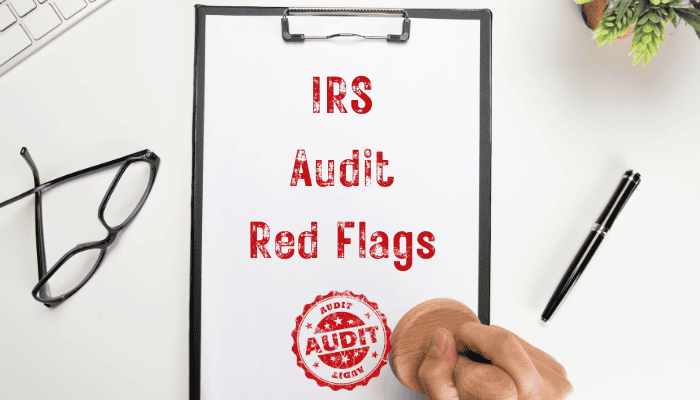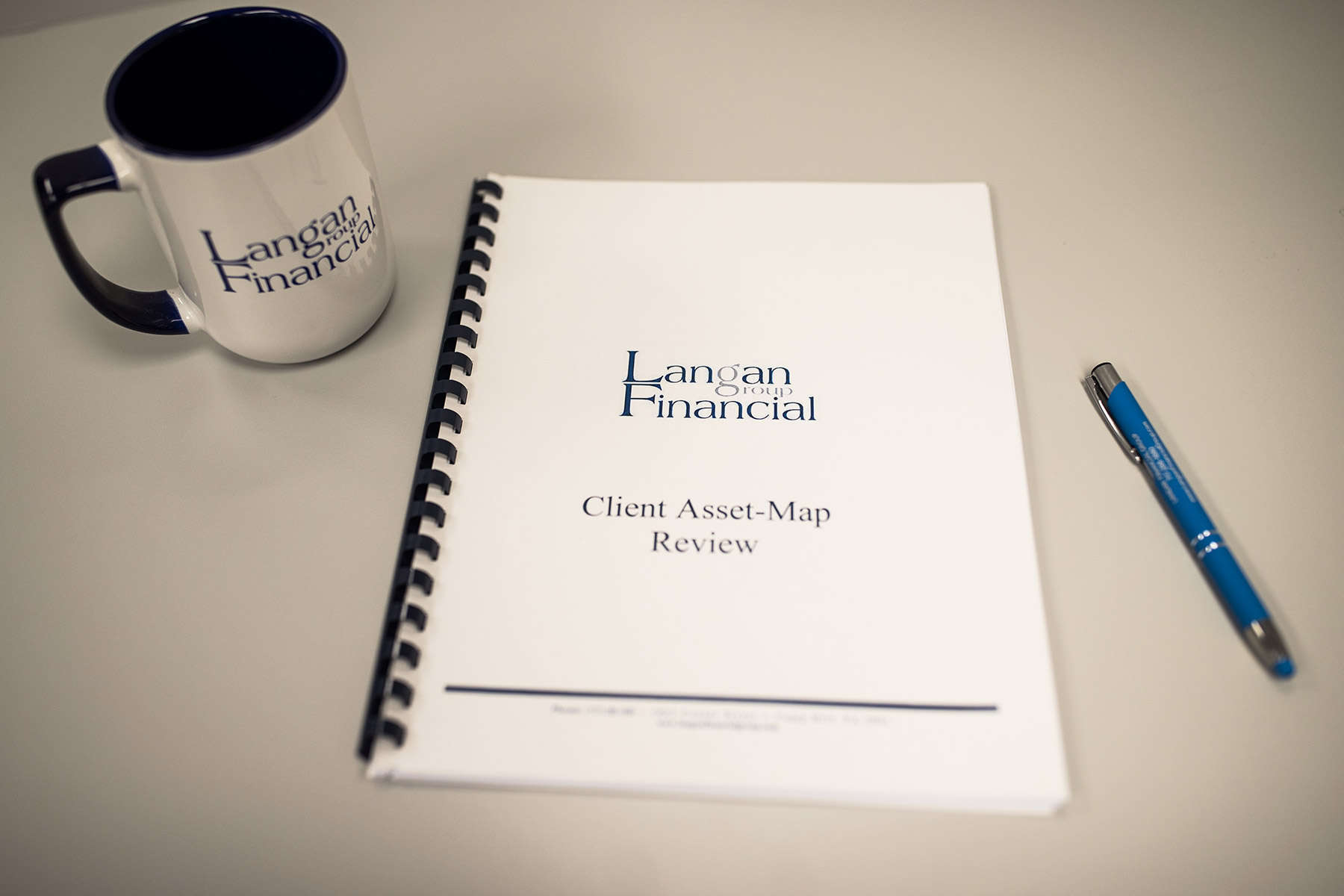Red flags in a 401(k) plan can trigger an audit or other scrutiny from the Internal Revenue Service (IRS). Below is a brief list of some common red flags that alert the IRS if an audit may be warranted. Use this list to identify 401(k) plan issues and make sure your TPA (third party administrator) can correct the issues as soon as possible to avoid penalties and further scrutiny

Red Flag #1: Out-of-Date Plan Documents
If new laws become effective that impact the 401(k), and the plan document has not been updated, this can be corrected by adopting an amendment. If an amendment was not adopted before the deadline, the plan may need to enter an IRS correction program.
To mitigate out-of-date 401(k) plan documents in the future, you can maintain regular contact with a financial advisor and Third-Party Administrator near you to annually touch base on the status of your plan documents. Additionally, the IRS has a calendar to see when you must complete amendments Required Amendments List | Internal Revenue Service (irs.gov)
Red Flag #2: Incorrect Contribution to the 401(k)
In order to fix an incorrect contribution to a 401(k), the plan sponsor will want to work with the advisor and TPA to apply a reasonable correction method that puts affected participants in the same position as if they were receiving the contributions according to the plan. This will also require the help of the payroll company to make the correction.
One way to mitigate this is to ensure that plan administrators, advisors, and TPA all have updated payroll and participant information so they can monitor that contributions are happening correctly.
Red Flag #3: Incorrect Participant Eligibility Determinations
If you find that an employee began receiving a 401(k) match before they were eligible, the match contributions will need to be forfeited back to the plan holding account. This is a relatively simple solution; however, it may be more difficult to have a discussion with the participant who incorrectly received these funds.
To mitigate this in the future, verify that all parties have the most up to date payroll and participant information, and that you are confirming that a participant is eligible to join the plan prior to their enrollment. Some recordkeepers and TPAs will also offer a 401(k) eligibility tracking service, which can alleviate a lot of the burden associated with eligibility.
Red Flag #4: Inadequate Monitoring of Loans and Distributions from 401(k)s
If an issue arises with a loan, it is likely that a corrective repayment or modification of loan terms should be made. A plan sponsor will want to work with the TPA to ensure the corrective repayment is made properly and resolves the issue with the loan.
Since 401(k) loan repayments are made through salary deferrals, this will involve modifying the amount that is deducted from their paycheck.
To mitigate any 401(k) loan compliance issues in the future, you should review each participant’s loan amount, term, and repayment terms at the origination, and ensure payments are being made with each payroll.
Red Flag #5: Inadequate 401(k) Participant Communications
Participants should receive disclosures prior to their enrollment in the 401(k) plan, and then annually thereafter. These communications should be sent out in a timely manner, for example if there is a plan level fund change, it should be sent out 30 days prior to the plan’s investment fund lineup change.
If a plan sponsor does not want to send out these disclosures to the participants, there is a service provided by both recordkeepers and TPAs that will distribute the 401(k) plan documents on your behalf.
What are the Consequences of a Failed 401(K) Audit?
The IRS can impose significant financial burdens on businesses through costly fines, interest charges, and legal fees.
Non-compliance can also damage a company’s reputation and trust among employees, stakeholders, and investors.
This could also lead to impacting the employees’ retirement savings by a potential loss of tax advantages, reduced benefits, or delayed distributions.
What are the Common 401(K) Audit Penalties?
The Internal Revenue Service (IRS) is responsible for enforcing compliance with tax laws and regulations governing qualified retirement plans. The IRS will use a variety of methods to monitor and enforce compliance. Some of the methods include audits, investigations, and penalty assessments. Penalties are generally monetary assessments, and there could be other consequences such as suspension of the plan.
Penalties for Failing to File your 401(k) Audit: This is a penalty imposed for failure to file required tax forms, like the 5500 Form by a specific deadline. Failure to file the Form 5500 can cost $250 per day from the IRS, and up to $2,586 per day (indexed for inflation) with no maximum from the DOL.
401(k) Plan Failure to Deposit Penalties
Penalties assessed for late or insufficient deposits of employee deferrals or employer contributions to the plan.
The IRS will calculate this penalty based on the number of days the deposit is late. See the below table for specific percentages:
| Number of Days the Deposit is Late | Amount of the Penalty |
| 1 – 5 calendar days | 2% of the unpaid deposit |
| 6 – 15 calendar days | 5% of the unpaid deposit |
| More than 15 calendar days | 10% of the unpaid deposit |
| More than 10 calendar days after the date of the first Failure to Deposit notice received | 15% of the unpaid deposit |
Prohibited 401(k) Transaction Penalties
The Employee Retirement Income Security Act (ERISA) governs retirement plans and will levy penalties if plan fiduciaries engage in prohibited transactions such as self-dealing or lending plan assets.
If a prohibited transaction happens, the agent can be faced with a penalty of 15%, and if not corrected, it can result in a penalty of 100% of the amount of the prohibited transaction.
IRS 401(k) Audit Compliance Correction Programs
The IRS offers a voluntary correction program, called the Employee Plans Compliance Resolution System (EPCRS), which allows plan sponsors to correct certain compliance failures and avoid or reduce penalties.
Strategies to Avoid IRS Fines. Best Practices for Maintaining Group Retirement Plan Compliance

Group Retirement Plan Compliance Monitoring
In order to avoid fines assessed on a 401(k) plan, there are multiple strategies that should be in place to orchestrate a successful 401(k) plan.
There should be regular reviews of the 401(k) plan documents, operations, and administrative procedures to assess the efficacy of the plan in its current state. From here, a plan sponsor and advisor will be able to pinpoint any inefficiencies and proactively address any compliance issues.
With the periodic review of the plan as a whole, this is also a good time to review the internal controls of the 401(k) plan. Take time to confirm with the recordkeeper, TPA, and financial advisor on the plan that all parties are aware of who is responsible for monitoring each aspect of the plan. .
Finally, at the plan review, the advisor should also review a compliance checklist that contains requirements, deadlines, and reporting obligations and assist the plan administrators in fulfilling their responsibilities.
Educating 401(k) Plan Sponsors and Participants
Proactive measures to address compliance issues such as training programs and proper communication channels are essential to the successful operation of a 401(k) plan.
A 401(k)-plan sponsor & participant training program would contain training for plan administrators and HR, as well as participant education. Plan administrators should receive training in the administration and regulatory requirements in order to effectively administer the plan. These meetings should happen periodically, addressing items that directly affect the plan.
Participant education, on the other hand, can take the form of seminars, workshops, and online tools. Helping the participants understand their rights, responsibilities, and investment options is essential in assisting the participant in planning for a successful retirement.
Employee Benefits Communication Channels
By establishing open communication channels, such as a dedicated helpline, newsletters, and e-mail updates, participants and plan sponsors can quickly receive updates and address any issues that may arise. There should be a dedicated contact at the advisor’s office, recordkeeper, and third-party administrator that each plan participant has access to. They should be available for questions from anyone involved in the 401(k) plan and its administration.
Steps to Fix Your 401(K) Plan Red Flags
Utilizing compliance monitoring, education plans, and proper communication channels, any issues you find should be remedied promptly. After any red flags have been identified, in order to correct them, the plan sponsor will need to work with the service team (Advisor, TPA, and Recordkeeper) to determine where the issue is and what the path to correction and compliance will be. This may be as simple as working with the IRS to correct the error, or it may be as cumbersome as initiating a Resolution Program from the IRS.
The final step in correcting red flags is to maintain documentation of any corrections made. This will be important to the administration of the plan in the future if any further issues should arise.
For more information regarding the correction of red flags, you can view the IRS article titled “Correct Your Retirement Plan Errors”
Correct Your Retirement Plan Errors | Internal Revenue Service (irs.gov)
About the Authors

Alexander Langan, J.D, CFBS, serves as a financial advisor at Langan Financial Group. In this role, he manages investment portfolios, acts as a fiduciary for group retirement plans, and consults with clients regarding their financial goals, risk tolerance, and asset allocation.
With a focus on ERISA Law, Alex graduated cum laude from Widener Commonwealth Law School. He then clerked for the Supreme Court of Pennsylvania and worked in the Legal Office of the Pennsylvania Office of the Budget, where he assisted in directing and advising policy determinations on state and federal tax, administrative law, and contractual issues.
Alex is also passionate about giving back to the community, and has participated in The Foundation of Enhancing Communities’ Emerging Philanthropist Program, volunteers at his church, and serves as a board member of Samara: The Center of Individual & Family Growth. Outside of work and volunteering, Alex enjoys his time with his wife Sarah and their three children, Rory, Patrick, and Ava.

Assoc. 401(k) Advisor
Harry Claypool currently serves as an Associate 401(k) Advisor at Langan Financial Group where he assists Alex in servicing retirement plans, preparing plan reviews, and handling administrative work. In his free time, Harry enjoys visiting new restaurants, spending time with friends and family, and watching the Eagles.
About Langan Financial Group
Langan Financial Group, based outside of Harrisburg, PA, is an independent financial planning firm established in 1985, offering a broad range of financial planning services. With an open architecture platform, our advisors have access to a diverse range of products, free from any sales quotas. Our team of 9 financial experts, each with unique specialties, enhances our ability to focus on delivering value to our clients.
Disclosure
Securities offered through Cambridge Investment Research, Inc., a Broker/Dealer, Member FINRA/SIPC.
Investment Advisor Representative, Cambridge Investment Research Advisors, Inc. a Registered Investment Advisor. Cambridge and Langan Financial Group, LLC are not affiliated.
Cambridge does not offer tax or legal advice.



